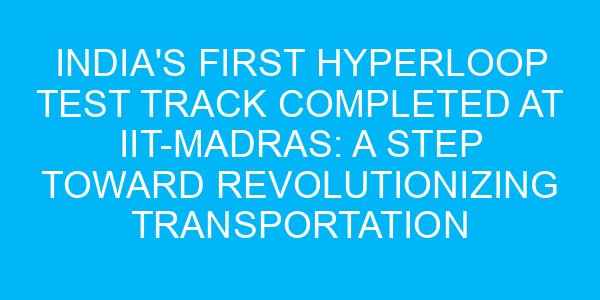India has reached a significant milestone in the field of transportation technology with the completion of its first-ever Hyperloop test track at IIT-Madras in Tamil Nadu. This achievement marks the beginning of the nation’s journey toward adopting ultra-high-speed transportation systems, aiming to redefine how people and goods move across the country.
Key Highlights
- Test Track Completion: The test track, which spans 410 meters, was built using over 400 tons of steel and represents a crucial phase in demonstrating the feasibility of Hyperloop technology in India.
- Collaboration and Innovation: This project is the result of a strategic partnership between Indian Railways, IIT-Madras, the Avishkar Hyperloop team, and the TurTr startup incubated at IIT-Madras.
- Successful Trial Run: The initial trial run on Thursday achieved a speed of 100 km/h, marking a promising start toward the long-term goal of reaching speeds of 600-1,000 km/h.
What is Hyperloop Technology?
Hyperloop is a next-generation transportation system where high-speed trains travel through near-vacuum tubes, drastically reducing air resistance. This allows them to reach speeds comparable to those of airplanes, promising efficient, ultra-fast travel across long distances.
Significance of the Project
- Sustainability: The Hyperloop is designed to be carbon-neutral, offering an environmentally friendly alternative to traditional modes of transportation.
- Government Support: The Ministry of Railways has pledged Rs 8.34 crore to support the initiative, underscoring the government’s commitment to advanced transportation technologies.
- Center of Excellence: In 2022, Union Railway Minister Ashwini Vaishnaw announced the establishment of a Center of Excellence for Hyperloop technology at IIT-Madras to accelerate development.
Future Prospects and Challenges
While the Hyperloop promises to revolutionize transport in India, experts acknowledge the challenges ahead. The country is still in the early stages of adopting bullet train technology, and scaling up the Hyperloop system for commercial use will require overcoming technical, financial, and infrastructural hurdles. However, the completion of the test track represents a major step forward, with many anticipating the transformative potential of this technology for Indian transportation.
Key Takeaways
- India’s first Hyperloop test track has been completed at IIT-Madras, marking a milestone in the country’s transportation evolution.
- 100 km/h speed reached in initial trial run, with future targets set between 600 km/h to 1,000 km/h.
- The project is backed by Indian Railways, IIT-Madras, and the Avishkar Hyperloop team.
- Government investment of Rs 8.34 crore signals strong support for this transformative technology.
- While there are challenges ahead, the successful completion of the test track brings India closer to realizing Hyperloop as a futuristic and sustainable mode of transportation.
This development sets the stage for a revolutionary shift in how India approaches transportation, with the potential to bring about unparalleled speed, efficiency, and sustainability in the coming decades.



